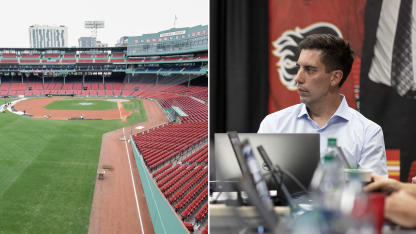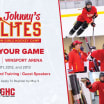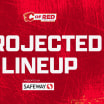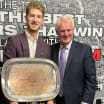It's magical, this place.
Maybe it's the 'Monster,' the century plus of history and heartbreak, or the fabled, 500-ft. shot from one of the top sluggers in Red Sox lore.
Here, nostalgia comes free with admission.
But there's more to Fenway than at-bats, base-running and record books. It's about the iconic cherry and hunter-green seats, the wholesome trace of fresh-cut grass, hot dogs and nachos, or stopping off at the Home Plate Deck for souvenirs, foam fingers and autograph cards.
"It feels like a real homecoming," said assistant general manager and Melrose, Mass. native Chris Snow. "But more importantly, it feels like a real triumph."
'DOING THE IMPOSSIBLE'
Flames AGM Chris Snow and family will throw out the ceremonial first pitch at Thursday's Boston Red Sox game

That's the beautiful thing about baseball: It appeals to our sensibility.
Our emotions.
It helps us appreciate life's little moments by spending them with those we love most.
Snow, who last walked through the gates at Jersey and Brookline about 15 years ago as a writer with the Boston Globe, is back where it all began.
And on Thursday, with more than 37,000 people on hand, another in a long line of historical moments will unfold at the centre of this beloved ballpark. Along with his 10-year-old son, Cohen, and six-year-old daughter, Willa, Snow will throw out the first pitch before the Red Sox take on the Tampa Bay Rays.
This, only one day after crossing a once 'impossible' mile marker - his 40th birthday.
"When I was diagnosed, I wasn't supposed to see my 39th birthday, let alone my 40th," said Snow, who is living with ALS and is not only a great friend, but a beacon of courage and inspiration to so many. "So, to walk out on that field, feel the ovation and really soak that in - and to have so many family and friends there - I can't even imagine what that will be like."
With everything the family has been through, no one deserves it more.
ALS has taken so much, from so many - but the Snows are unwavering. They're determined to win this fight for all who have suffered at the hands of this cruel illness.
So, moments like Thursday at the revered diamond remind us not of the damage it's done, but of the gratitude we still have.
"The best part is that my kids get to be part of it," Snow said. "Willa will throw a pitch from short range to the mascot, and Cohen - who's turning 10 that day, which is pretty cool - is adamant that he throws the full 60 feet and six inches off the rubber.
"Then I'll go.
"And, ideally, I'll get a few throws to warm up with first.
"Remember President Bush after September 11 at Yankee Stadium? Packed house, he had the bulletproof vest on - incredible moment. He threw an absolute strike. So, the goal is somewhere between THAT and Dr. Fauci last year when he bounced it to first base."
His final full season Lou Gehrig hit .295 with 29 home runs. With #ALS. Today, on #LouGehrigDay across @MLB, 2 years after my diagnosis and 1 year after I was supposed to die, I picked up a wood bat with my one useful hand. I am proof. Science is gaining on this disease. 1/4 pic.twitter.com/KBaiKkocf6
— Chris Snow (@ChrisSnowCGY) June 2, 2021
ESPN Insider Jeff Passan made it all possible, chatting with Snow and then placing a call to Red Sox president Sam Kennedy to get the wheels in motion. Five minutes later, it was a done deal and the nine-time World Series champs began planning out the evening.
The Red Sox have generously offered the Snows a 35-person suite to celebrate the occasion. Family and friends from all over North America, including Calgary, Toronto, Pittsburgh, San Diego, Chicago and Washington, D.C. will be on hand to cheer them on, as well as an ESPN camera crew as part of an upcoming E:60 feature on the family.
It promises to be a night to remember.
"On top of everything else, through COVID, we've not seen most of these people in at least two years - and in some cases, even longer," Snow said. "The adrenaline will be off the charts. It's going to be a ton of fun for the whole family and, truly, a memory that will last a lifetime."
For Snow, moments like these are a gift - because it shouldn't have happened at all.
It was early in 2019 when he began to feel numbness in his fourth and fifth fingers in his right hand. Initially, he thought he pinched a nerve in his elbow while working out and, at worst, needed surgery to correct the issue.
A neural pathway procedure in May, followed by another in June, said otherwise.
He was officially diagnosed with a rare form of amyotrophic lateral sclerosis, caused by a gene passed down through the family. The disease - which causes the motor neurons in the brain and spinal cord to gradually degrade, and then die - has already taken his father, two uncles, and his 28-year-old cousin.
As a result, he immediately enrolled in a Phase 3 clinical trial at Sunnybrook Health Sciences Centre in Toronto, a research centre that specializes in treatment for patients with this rare, familial mutation - SOD1.
Initially, Snow saw very little change from the onset of his symptoms, thanks - he believes - to the experimental drug, tofersen. At this point, he'd already lost the use of his right hand and arm, adapting to this new challenge by staying active and outfitting his bicycle, golf clubs, hockey stick and baseball bat with a custom grip so he could still do the things he loved.
(When he takes to the mound on Thursday, he'll chuck a fastball with his left hand - the southpaw stylings he forced himself to learn, and has gotten awfully good at, over the past few months.)
But April of 2020 brought a crushing development.
While the family was out sledding, his wife, Kelsie, huddled the family together for a group photo.
His normally bright, affectionate smile was … off.
By July, he could no longer smile at all, with the atrophy in his cheeks, lips and even eyebrows progressing quite rapidly. With it, his voice began changing, too.
It was then that Snow decided to begin recording his voice in a process called "banking" to preserve his original sound in case he lost the ability to speak altogether. Stephen Hawking and Snow's greatest inspiration, former NFLer Steve Gleason, are the two most famous examples of that.
However, in this particular conversation - after not speaking with Snow since a pre-pandemic road trip - he sounded, to me, like the same old Chris.
As Kelsie so beautifully puts it: "Someone has to be the first person to live with ALS, rather than die from it.
"One thing I've always known about Chris is that he finds a way. No matter the obstacle, no matter how unprecedented the situation may be - he always, always finds a way."
Today - more than two years after he was given half that to live - Snow is living, breathing proof that anything is possible.
Sometimes, though, we all need a bit of a nudge.
ALS was supposed to take my breath away by now. Instead, the Bow River did. Imagine your fridge is full of water, jump in, and that’s about what you have here (40 degrees F, 5 Celsius). #TrickShot4Snowyhttps://t.co/rgWfPCOrpt pic.twitter.com/iJJjjxjvjQ
— Chris Snow (@ChrisSnowCGY) July 29, 2020
"I've been lucky enough to coach Cohen in hockey and baseball for the past five or six years," Snow said. "But going into the baseball season this year, my feeling was that it had gotten to the point where I didn't think my capacity to articulate and project was good enough for the kids.
"I thought they deserved better.
"But then I was asked.
"I think Cohen, actually, had a little bit of concern going in that the kids would say, 'What? What?!' But then, after our first practice, he said, 'Dad, all the kids understood you. It was great!' I found it wasn't that difficult and I really enjoyed it.
"Those days and nights coaching and playing outdoors are the days that I feel healthiest, and I think that's all mental.
"I've affirmed - again - that while I have changed, I can still do these things.
"I tried, through this entire process, not to do anything differently - meaning, if I think I can do it, or there's a chance I can do it, I have to say yes.
"I've got to lean into it and not accept defeat."
The courage is remarkable.
ALS is one of the most unforgiving things a family can possibly go through - and yet, he has hope.
His quality of life has actually improved since the winter. He now has an 'eating tube,' as the family calls it, which has helped removed the stress of possible choking hazards, and has allowed Snow to re-gain all the weight that he lost from spending the previous few months only having small amounts of food.
It was a hard decision, but one that had to be made after Snow's ability to swallow had weakened considerably.
Calorie count by day:
— Chris Snow (@ChrisSnowCGY) December 7, 2020
Monday: 0 (Surgery)
Tuesday: 1,920
Wednesday: 3,120
Thursday: 3,555
Friday: 4,175
Should have done this weeks earlier. I get what I need by way of the tube and eat/drink in small amounts for taste things that are easy and enjoyable. Whole house is at ease. pic.twitter.com/E0L4TDzZj2
"The right hand - whatever. It's been gone for two years and I don't think about it," he said. "Eating, I miss a little here and there, but I get so full so often because of all the calories through the tube that I honestly don't think about it that much.
"I still eat a little where I can. Like, I eat slippery foods and milkshakes, coffee, that kind of thing. But the other night, here at the lake, I ate an entire thing of oysters. I didn't know that I could do that. That felt good. That told me again, you're still essentially where you were several months ago."
Kelsie and Chris touch wood when they say this, but they call it a "plateau-like state."
He really hasn't gotten any worse over the past few months. And while the trial drug hasn't worked perfectly, it has worked remarkably to lessen the impact on this awful disease.
"Every time I look around and see this community on Twitter that is fully supporting us - and, also, for the many that have the disease and are getting worse - I have a chance that so few do," Snow said. "I'm not going to waste that.
"When we step back and realize that I'm riding my bike, playing golf, coaching baseball, playing with the kids like I used to ... I'm doing awesome.
"The challenges I've had are at this point much more mental than physical. Mental is the fear of getting worse and the unknown. Mental is the anxiety of social settings where I have to talk, standing up, and talk for long periods of time. That's a challenge I have to face daily.
"For everything else, I feel an immense amount of gratitude."
The Snow family is currently vacationing in New Durham, N.H. - about a 90-minute drive north of Boston.
It's their 'happy place.'
A spot where they can all escape the harsh realities and be free, cannonball off docks and feel the warm glow of the sun, from daybreak to golden hour.
It's what living is all about.
June 17, 2019: Diagnosed with an aggressive genetic type of #ALS and given 1 year to live.
— Chris Snow (@ChrisSnowCGY) June 18, 2021
June 17, 2020: Kicked a 43-yard field goal.
June 17, 2021: 1st hole @MickelsonNGC, useless right hand, 3 years since I stood on a tee box, 265 yards dead center. Played all 18. pic.twitter.com/F3zADc5iea
"To be here and to see and reflect on the childhood memories that I have, and seeing all the kids doing the same thing I did - going out on the tube behind the boat, swimming in the lake - it's great," Snow said.
"Each day we try to take it as slow as we can. Cohen always tells me, 'Dad. Eight days down, still 14 days to go.'
"I'm still doing that now.
"I'm trying to take these days as slow as I can and really soak this in, because I could easily take myself back to the place when I was diagnosed and realize that it was facing the impossible.
"But we're DOING the impossible. Right now.
"So, let's keep proving them that."
--
Donate to the Calgary Flames Foundation to directly fund ALS research and new treatments at the most progressive institutes, including Sunnybrook Brain Sciences Centre in Toronto.
Chris visited Sunnybrook 13 times over a nine-month period to participate in a clinical trial under the supervision of Dr. Lorne Zinman, the founder and first chair of the ALS Research Network. As of May 1 Chris is participating in the same gene therapy study at the University of Calgary under the leadership of Dr. Lawrence Korngut, the longtime chair of the Canadian Neuromuscular Diseases Network. The drug Chris receives every four weeks targets the specific genetic mutation that has devastated Chris' family. Research dollars produced this treatment, and research dollars will accelerate a cure.


















